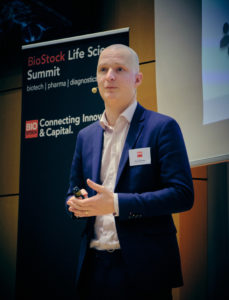
Immunicum i rampljuset på Cancer Progress-konferensen
Det finns ett flertal strategier inom immuno-onkologin att göra vårt eget immunsystem mer känsligt och reaktivt mot cancerceller och metastaser. Det svenska bioteknikbolaget Immunicum har utvecklat en egen strategi vilken man ombads att presentera och diskutera i en panel med immuno-onkologiska experter vid 31st Annual Cancer Progress Conference förra veckan. BioStock kontaktade Immunicums COO, Sijme Zeilemaker, som representerade bolaget i paneldiskussionen, för att få veta mer om diskussionen och hur Immunicum gör avtryck inom detta område.
Inom cancervården har immuno-onkologi (IO) vuxit fram som en av de mest lovande lösningarna på denna dödliga sjukdom. Under det senaste decenniet har området genererat flera behandlingar baserade på användning av immunceller, t.ex. adjuvansimmunterapi, T-cellterapier och checkpoint-hämmare (CPI), och har lyckats reducera dödligheten i de flesta cancerformer. Behovet av ännu bättre behandlingar är dock fortfarande stort, och just nu utvecklas flera immunonkologiska strategier som potentiella lösningar på cancergåtan.
Olika IO strategier för att lura cancer
En av de främsta anledningarna till att cancer är en så dödlig sjukdom, är det faktum att cancerceller kan undvika immunförsvarets mekanismer och sprida sig i kroppen. Behandlingar som baseras på IO har blivit populära tack vare deras förmåga att lära immunsystemet att vara mer mottagligt för cancerceller och därmed bli mer reaktivt innan cancern tar över kroppen.
IO är dock ett komplext område där man testar flera innovativa metoder för att lära immunsystemet att bättre bekämpa cancer. Ingen vet ännu vilken strategi eller kombination av strategier som kommer att leda till de bästa behandlingarna, men ämnet är ofta ett viktigt debattämne vid internationella onkologikonferenser.
En av dessa strategier är att utveckla en off-the-shelf allogen cellterapi som kan injiceras i själva tumören och orsaka en kedjereaktion i immunsystemet där inflammatoriska molekyler som kallas kemokiner och cytokiner, uppmanar mördar T-celler att känna igen och attackera tumörcellerna.
Immunicum presenterar sin IO-strategi på internationell konferens
![]() Stockholmsbaserade Immunicum har valt den här strategin och bolaget har genomfört kliniska fas II-studier med sin huvudkandidat, ilixadencel, i patienter med metastaserande njurcellscancer (MERECA-studien). Läs mer om bolagets strategi och fas II-studien här.
Stockholmsbaserade Immunicum har valt den här strategin och bolaget har genomfört kliniska fas II-studier med sin huvudkandidat, ilixadencel, i patienter med metastaserande njurcellscancer (MERECA-studien). Läs mer om bolagets strategi och fas II-studien här.
Bolaget bjöds in till att presentera vid 31st Annual Cancer Progress Conference, som p.g.a. Covid-19-pandemin anordnades virtuellt mellan 5 och 6 maj 2020. Konferensen organiserades av Cello Health och förde samman innovatörer inom området från hela världen. Även stora onkologiska institutioner deltog i konferensen, såsom Cancer Research Institute, en ideell organisation som ägnar sig åt att främja immunterapi för att behandla och bota cancer och som beskriver immunterapi som ” the most promising treatment of our time.”
Immunicums COO Sijme Zeilemaker deltog i konferensen genom att medverka i en paneldiskussion med titeln,Paradigm-shifting platforms I, IO: Taking IO to the next Level. Han fick sällskap i panelen av representanter för sex andra bolag som utvecklar olika IO-plattformar. Samtliga sex bolag lade fram sina innovativa strategier. Se hela programmet och listan över paneldeltagare här.
BioStock kontaktade Sijme Zeilemaker för att få veta ner om paneldiskussionen och hur Immunicums strategi positioneras inom IO-området.

Sijme Zeilemaker, first of all, what does it mean to you and to Immunicum as a whole to be able to participate in a panel discussion at this cancer conference?
– It is great to be recognised as a novel platform among all the exciting developments in the highly competitive field of immuno-oncology. The unique character of our approach was central to being part of this panel of paradigm-shifting platforms, in which highly differentiated platforms that may become the future of cancer therapy shared the spotlight.
Could you summarise, in a few words, the take-home message of the panel discussion?
– Science is moving at an extraordinary pace especially in the field of IO in which the high unmet needs create this urgency of development. The overlapping message from these different platforms was that the future of cancer therapy requires a highly personalised and tumour-specific immune response induced by a more potent and broader mechanism of action. This mechanism of action should involve different classes of immune cells, preferably combined with an off-the-shelf manufacturing ability to be able to address patients across the globe in a cost-effective way. The advent of cell therapies and allogeneic platforms was crucial to this discussion.
Immunicum’s main candidate, ilixadencel, is a so-called off-the-shelf allogeneic approach. In simple terms, what does that mean exactly?
– It means that this cell therapy does not derive from the patient’s own cells, but can be produced from a healthy donor (thus allogeneic), and thereby in a more consistent, cost-effective and scalable manner. Specific to our mechanism of action, our cells are able to be derived from healthy donors as we activate these specific immune cells to become inflammatory dendritic cells (DCs) as the central kick-starters of immunity against the tumour. The allogeneic nature of the cells actually contributes to this mechanism, activating the patient’s own immune cells as the ones to ultimately carry out a strong and sustained tumour-specific immune response.
»Ultimately, the hope of immuno-oncology is not just to delay cancer growth as with more traditional cancer therapies, but to lead to durable tumour decreases and even potential cures. Immunicum has observed this where the treatment of ilixadencel induced more durable and complete responses in its recently completed Phase II study in kidney cancer« — Sijme Zeilemaker, COO för Immunicum
How does this approach differ from some of the others presented at the panel discussion?
– The panel included approaches to enhanced tumour radiation, an allogeneic mixed cell therapy, and bispecific antibodies. Each is able to address parts of the cancer immunity cycle, i.e. all elements of the immune system needed to recognize and attack cancer, by for example inducing immunogenic tumour cell death, activating Natural Killer (NK) cells, or stimulating the expansion of immune cells.
– Unfortunately, cancer has established itself with multiple defence mechanisms, and only targeting one such mechanism while leaving open other pathways allows for cancer evasion and escape. Immunicum’s ilixadencel primarily addresses this by focusing on a more complete mechanism of priming the immune system: by injecting inflammatory DCs in the immunosuppressive environment of the tumour and inducing a cascade of immune cells, such as NK cells, bystander DCs and killer T cells, to counteract the tumour cells.
In broader terms, how does Immunicum’s approach stack up with other IO approaches being used, in terms of benefit for the patient, and why do you think the Cancer Research Institute refers to immunotherapy as “the most promising treatment of our time?”
– Our preclinical and clinical data suggest that this more complete mechanism of action is synergistic to systemic therapies such as kinase inhibitors and checkpoint inhibitors to enable the activated immune response to fully carry out its cancer-killing ability. Ultimately, the hope of immuno-oncology is not just to delay cancer growth as with more traditional cancer therapies, but to lead to durable tumour decreases and even potential cures. Immunicum has observed this where the treatment of ilixadencel induced more durable and complete responses in its recently completed Phase II study in kidney cancer.
Innehållet i BioStocks nyheter och analyser är oberoende men BioStocks verksamhet är i viss mån finansierad av bolag i branschen. Detta inlägg avser ett bolag som BioStock erhållit finansiering från.



